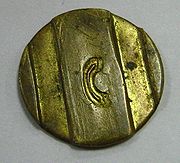
Telephone token
Encyclopedia

Telephone card
A telephone card, calling card or phone card for short, is a small plastic card, sized and shaped like a credit card, used to pay for telephone services. It is not necessary to have the physical card except with a stored-value system; knowledge of the access telephone number to dial and the PIN is...
s to collect and use. These tokens were once widely used in Europe
Europe
Europe is, by convention, one of the world's seven continents. Comprising the westernmost peninsula of Eurasia, Europe is generally 'divided' from Asia to its east by the watershed divides of the Ural and Caucasus Mountains, the Ural River, the Caspian and Black Seas, and the waterways connecting...
, Israel
Israel
The State of Israel is a parliamentary republic located in the Middle East, along the eastern shore of the Mediterranean Sea...
, Japan
Japan
Japan is an island nation in East Asia. Located in the Pacific Ocean, it lies to the east of the Sea of Japan, China, North Korea, South Korea and Russia, stretching from the Sea of Okhotsk in the north to the East China Sea and Taiwan in the south...
, and South America
South America
South America is a continent situated in the Western Hemisphere, mostly in the Southern Hemisphere, with a relatively small portion in the Northern Hemisphere. The continent is also considered a subcontinent of the Americas. It is bordered on the west by the Pacific Ocean and on the north and east...
, and are still used today in Turkey
Turkey
Turkey , known officially as the Republic of Turkey , is a Eurasian country located in Western Asia and in East Thrace in Southeastern Europe...
.
Phone tokens started in Chicago
Chicago
Chicago is the largest city in the US state of Illinois. With nearly 2.7 million residents, it is the most populous city in the Midwestern United States and the third most populous in the US, after New York City and Los Angeles...
, where public phones would accept only tokens. These were used in the U.S. until 1944 when they were eliminated and most of the tokens were melted down to make shell casings. The earliest-known telephone token dates from 1885, when it was produced for the PAN Telephone Company
Telephone company
A telephone company is a service provider of telecommunications services such as telephony and data communications access. Many were at one time nationalized or state-regulated monopolies...
in Saint Louis, Missouri. Rather than being deposited in the phone, the token was given to an attendant or placed in a coin
Coin
A coin is a piece of hard material that is standardized in weight, is produced in large quantities in order to facilitate trade, and primarily can be used as a legal tender token for commerce in the designated country, region, or territory....
box to gain access to the phone booth.
This practice of using tokens and allowing their specific value to float with the going rate for a phone call eventually became the standard world-wide practice. This came in especially handy in European countries where currencies changed once you crossed borders, but a token could still be useful.
In some countries, such as Italy, they were even used informally as cash equivalents.

